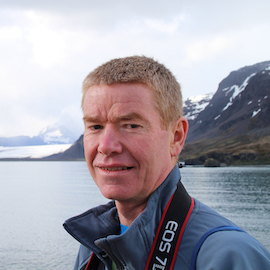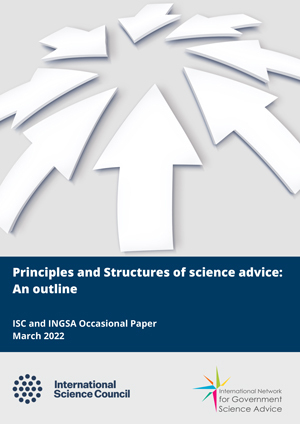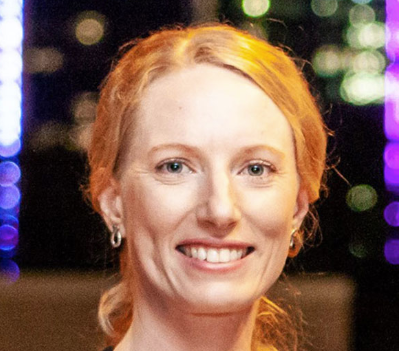
The Science Policy and Diplomacy Newsletter of the Australian Academy of Science highlights important science policy discussions and events in Australia and around the globe. We report on the involvement of science in national and international policy and diplomacy, and the Academy’s contributions to these discussions.

In 2009, the Scientific Committee on Antarctic Research (SCAR) released its Antarctic Climate Change and the Environment Report (ACCE Report). Given SCAR’s science to policy advice role, the report was aimed specifically at the Antarctic Treaty Consultative Parties (ATCPs) – the governments that determine policy for this international space.
The effect was immediate. An Antarctic Treaty Meeting of Experts was convened within twelve months and a new program of work was adopted to respond to climate change in the region.
Despite a decade of work, the state of the continent and its surrounding Southern Ocean has deteriorated, and projections under current greenhouse gas emissions scenarios indicate further significant changes to the Antarctic system and its biodiversity.
This year SCAR released an updated Decadal Synopsis of the ACCE Report, timed to coincide exactly with the meeting of the ATCPs. In response, governments made further pledges: dedicated discussion of policy and research requirements at their forthcoming meeting in Helsinki in 2023, further attention by the climate change subsidiary group to the report’s recommendations, and a set of actions to convey the report to policymaking and science advisory bodies globally.
An outside view of these responses over a decade might leave an impression of much talk, but little effect. After all, the state of the Antarctic and Southern Ocean environments has not improved over the past decade. Decision-making seems to have become even more difficult within the Antarctic Treaty System over the same period owing to both regional and international geopolitics. And bad news continues to pour in, such as the very low sea ice extent for July 2022.
Yet, an inside view reveals a genuine willingness by the majority of the ATCPs to act on the available evidence for the climate crisis and its impacts. Over the nearly 20 years I have spent at the meetings of the ATCPs, the appreciation for the evidence, and for the scientific endeavour that is required to deliver it, has grown tremendously. It has never been as strong as it was at this year’s Berlin meeting.
That does not mean an absence of political challenges. None of our interactions, as humans, are free from politics. But the change in perspective has been tangible.
Of course, there’s also clear evidence: the growth in scientific knowledge over the years separating the two SCAR reports. Comparing them makes this clear. Despite the challenging news, the governments involved in the Antarctic treaty system have continued to invest in the research. Countries not interested in hearing the evidence can always seek to direct investment to other areas of science or simply disinvest. This has not happened for Antarctic research – in fact, the contrary is the case.
Scientists and diplomats are often characterised as being unable to communicate: scientists refusing to speak understandably, diplomats refusing to listen. That characterisation is flawed. Scientists have been speaking clearly at least since TH Huxley’s days. And diplomats have been listening. What has changed is the growth of distrust in both forms of expertise. That’s where the main challenge now lies.

An occasional paper by the International Science Council and the International Network for Government Science Advice explains key structures and processes in a clear and straightforward manner, so the essential elements of science advice are understood.
A new report by the European Commission’s Joint Research Centre, ‘Competence Frameworks for Policymakers and Researchers working on Public Policy’, makes a case for the role of cross-cutting competencies in enabling effective, innovative and evidence-informed policies.
The Global Young Academy’s Science Advice Working Group launched the Science Advice Resource Centre, a platform that features peer-reviewed articles on governmental science advice, science policy, science diplomacy, and science communication by and for early-career researchers.
The Academy brings together leading Australian experts to consider and advise the nation on scientific issues, providing authoritative information and advice on current science, technology and emerging research to inform discussion and assist evidence-based policy development and decision-making.
The iconic Shine Dome, home of the Australian Academy of Science, was officially reopened in June by the Governor-General of Australia, His Excellency General the Hon David Hurley AC DSC (Retd), and the Hon Ed Husic MP, Minister for Industry and Science, in the presence of the President of the Academy, Professor Chennupati Jagadish. A recording of the reopening and transcripts of General Hurley’s and Minster Husic’s speeches are available on the Academy’s website.
Over time, ad-hoc interventions, various departmental initiatives and overlapping state and federal priorities have led to a system that is spread over 202 programs and 13 federal portfolios, with multiple ministers and departments having key responsibilities: an overly bureaucratised and inefficient system. Read the Academy’s analysis of why Australia needs a national science and research strategy.
In Australia, we’ve experienced several catastrophic events in the past few years: bushfires and floods turbo-charged by climate change and an enduring pandemic. Former Academy President Professor John Shine reflected on how we’ve managed these overlapping events. Read Professor Shine’s article.
On 24 June, the Academy launched a new report, Australia’s data-enabled research future: Science. The report presents key strategic data-related needs and challenges for scientific research captured by the Academy through consultations with researchers and other experts across a range of science disciplines.
The report is the result of a partnership between the Australian Research Data Commons (ARDC), Australia's five learned academies and the Australian Council of Learned Academies (ACOLA) to ensure Australia can undertake excellent data-enabled research across all fields of research. Five domain reports were developed, and a synthesis report focused on common themes and cross- and inter-disciplinary opportunities and needs.
In June, the Academy provided a submission to the Department of the Prime Minister and Cabinet on the Australian Data Strategy. The Academy outlined that the national strategy should view data as a public good and must enable effective access to data by Australia’s research community, which is both a significant source and user of data.
Science continues to transform our lives and answer some of the world’s greatest mysteries. But why does it matter and what does it mean to value science? Watch six of Australia's leading scientists share why science matters.
The Academy celebrated NAIDOC Week with a virtual webinar embracing Indigenous Knowledges in STEM. Academy Fellow Professor Tom Calma as MC engaged panellists in a discussion about their experience embracing Indigenous Knowledges in STEM and ways to foster a more inclusive and diverse STEM sector. Watch a recording of the webinar.
The results of the first national survey to investigate research integrity in Australia, a collaboration between the Australian Academy of Science and publisher Springer Nature, indicate broad support for mandatory research integrity training.
The Academy’s responses to COVID-19 and climate change are among the many achievements highlighted in its annual report for 2021.
This Academy report presents key strategic data-related needs and challenges for scientific research captured by the Academy through consultations with researchers and other experts across a range of science disciplines.
On 27 July, Academy President Professor Chennupati Jagadish made a statement responding to the introduction of the government’s Climate Change Bill 2022.
On 19 July, Academy President Professor Chennupati Jagadish made a statement in response to the 6th national State of the Environment report.
On 31 May, The Academy welcomed new ministers appointed under the new government following the federal election in May.
On 18 May, Australian Academy of Science Chief Executive Anna-Maria Arabia made a statement responding to the decision to hold a second inquiry into the convictions of Kathleen Folbigg.
A report from the International Science Council outlines plausible scenarios for the COVID-19 pandemic to consider the options for achieving the most desirable end to the crisis, highlighting those decisions made over the coming months and years that need to be informed not only by short-term priorities but also by long-term challenges and will serve as an analytical tool for policymakers to lead to a more optimistic outcome to the pandemic.
In June, the Committee on Data (CODATA) launched a two-year project that aims to advance the implementation of the FAIR (Findable, Accessible, Interoperable, and Reusable) data principles. CODATA is a committee of the International Science Council. The project is funded by the European Commission’s Horizon Europe Framework Programme.
Discover the new monthly podcast series from the International Science Council’s global program on Urban Health and Wellbeing.
Nick Ishmael-Perkins, Senior Consultant at the ISC and host for the series, sums up the key takeaways from our weekly sessions that took place from May to June. Read the takeaways and watch the webinars in full.
The Scientific Committee on Antarctic Research (SCAR) has released a concise compiled report of current understandings and explicit recommendations for action to address climate change in Antarctica. The report aims to be a readily accessible overview of knowledge and projections for climate change. Read the report.
A series of NASA rockets have been launched into space from the Northern Territory over the past weeks. Three scientific sub-orbital sounding rockets were launched from the Arnhem Space Centre, which is owned and operated by Equatorial Launch Australia. This is the first time that NASA rockets have been launched from a commercial facility outside the United States. Read the media release from the Prime Minister, the Minister for Industry and Science and the Northern Territory Chief Minister.
In June, the United Nations’ Scientific and Technological Community Major Group (STC MG) submitted a position paper to the 2022 High-Level Political Forum (HLPF), which was held on 5–15 July. The theme of this year’s HLPF is ‘Building back better from the coronavirus disease (COVID-19) while advancing the full implementation of the 2030 Agenda for Sustainable Development’. The STC MG is jointly facilitated by the International Science Council and the World Federation of Engineering Organizations.
A year-long international dialogue to define principles and values in research launched in July, with almost 50 countries attending an EU-convened conference to start what could be a contentious discussion. The discussion developed from the EU’s Global Approach to Research and Innovation, a policy initiative launched last year that takes a more cautious approach to collaboration, particularly with China.
The Australian Academy of Technology and Engineering (ATSE), in collaboration with the Australian Academy of Science, will deliver the Australian Government’s $18.2 million ‘Global Science and Technology Diplomacy Fund – Strategic Element’, a key part of the new $60.2 million GSTDF fund.

Dr Georgina Gurney from James Cook University has been nominated as Australia’s candidate for the APEC Science Prize for Innovation, Research and Education (ASPIRE) Prize. The prize, valued at US$25,000, recognises young scientists from Asia–Pacific Economic Cooperation (APEC) member economies who have demonstrated a commitment to excellence in innovation, research and education. Read more about Dr Gurney.
Date: 27-28 April (recorded conference)
Event website
Science Advice Under Pressure explored the key challenges of delivering science advice under pressure through a series of panel debates, interactive sessions and networking opportunities. The event reflected on the diverse experiences of many different actors in the field, debating the values that underpin science advice and sharing good practice.
Date: 26 May – 23 June (recorded webinars)
Event website
The Talk Back Better Webinar Series was an initiative of the International Science Council through its Public Value of Science program. The series provided discursive analysis on science communication practice along with useful practical tips for researchers and research managers.
Date: 7 July (recorded webinar)
Event website
The International Science Council has conducted a panel discussion reviewing the 17 Sustainable Development Goals. This event sought to highlight emerging lessons, focus on the prospects of achieving the 2030 Agenda, and the actions and priorities for accelerated progress through science, engineering, technology and innovation.
The Australian Academy of Science occasionally partners with Australian Government departments and other science and research organisations to produce independent research reports and science advice, and facilitate international science linkages on their behalf.
If you are interested in working with the Academy please contact us.
© 2026 Australian Academy of Science